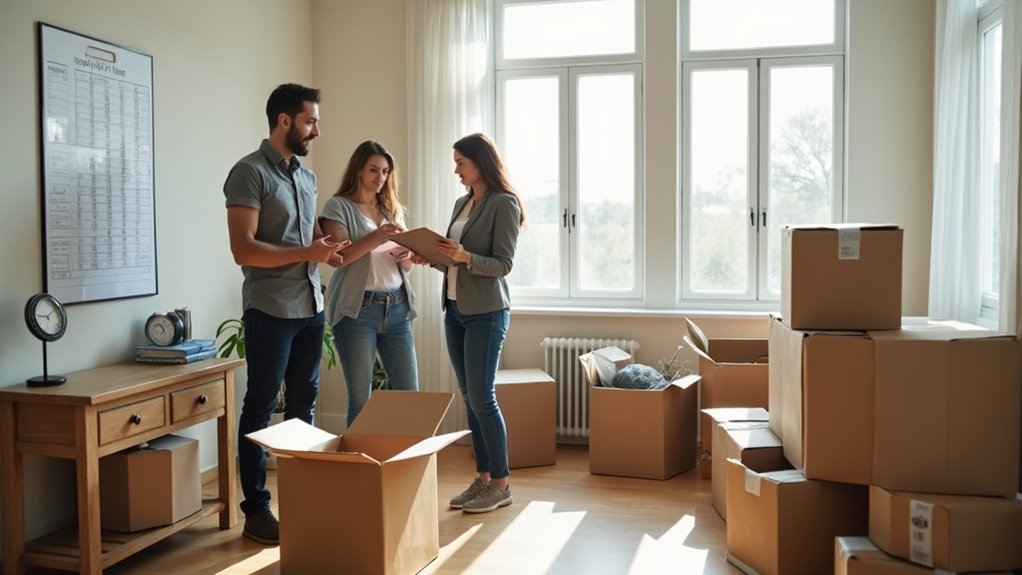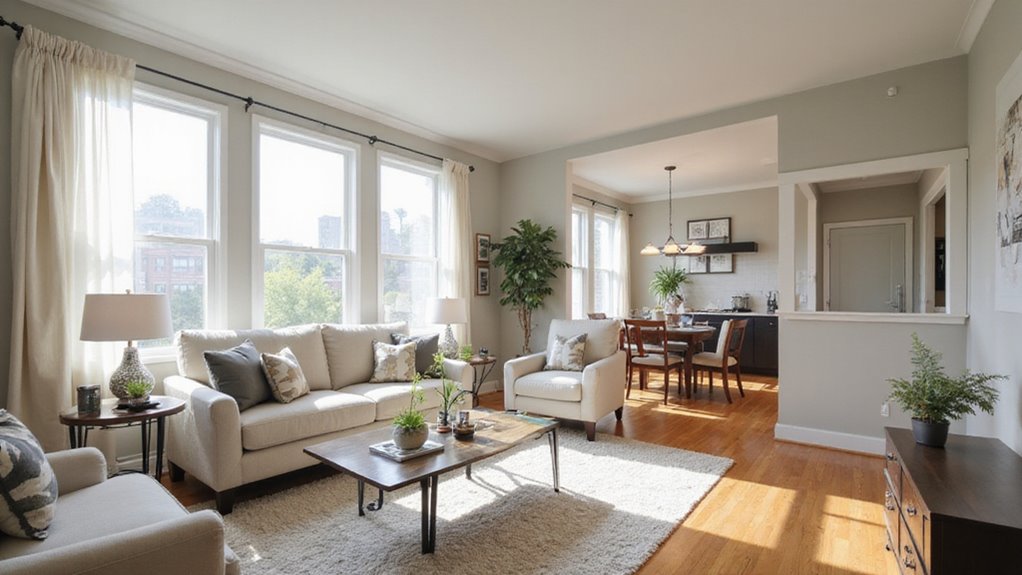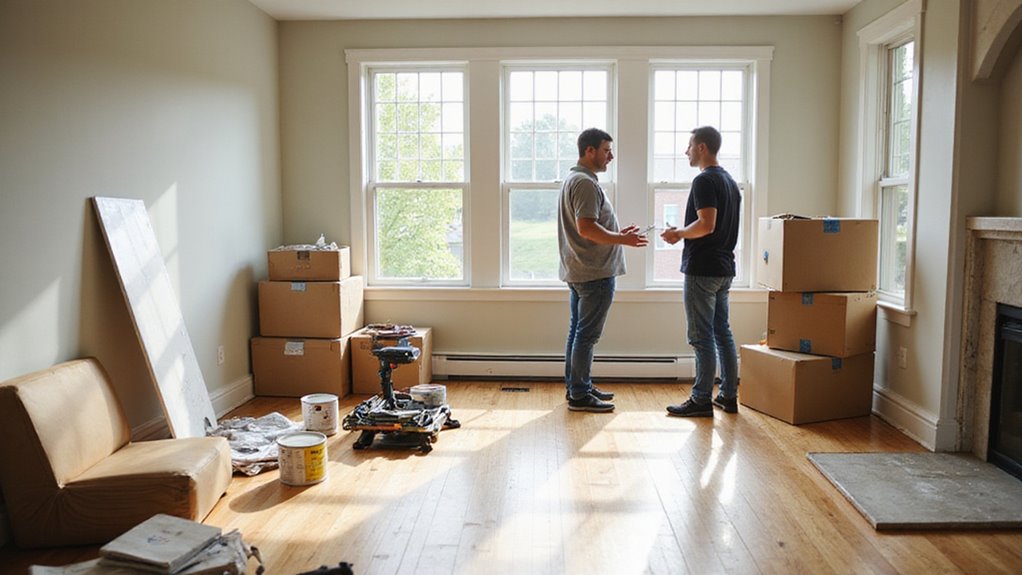Moving to another state is stressful, especially when you need to sell your house quickly. Many homeowners worry about timing, market value, and handling the sale from afar. The process can feel overwhelming without a good plan.
Delays can cost you money and create legal problems. Sellers often face uncertainty about pricing, preparing the home, or managing showings remotely. Without a clear strategy, you risk losing both time and profit.
The best way to sell your house when moving to another state is to use proven strategies that make your sale fast and smooth. With the right approach, you can attract buyers and close without added stress. This blog will show you how to sell your house easily and avoid common mistakes during your move.
Key Takeaways
- Hire a local real estate agent experienced with remote sellers and out-of-state relocations for expert guidance and coordination.
- Stage and professionally photograph your home to maximize online appeal and attract serious buyers quickly.
- Research the local market to set a competitive price, ensuring a faster sale and fewer delays.
- Use virtual tours, 3D walkthroughs, and digital marketing to reach remote buyers and expand your audience.
- Manage offers, contracts, and closing documents securely through digital platforms and remote notarization for a smooth, compliant transaction.
Assessing Your Timeline for Selling and Moving

You should first decide how soon you need to sell and move. Your timeline will affect how you prepare and price your home. This step helps you set clear goals for the process.
If you must move quickly, focus on staging your home and setting a fair price. Staged homes often sell faster and for more money. Efficient preparation can attract buyers in less time. If you’re aiming for a fast and streamlined sale, consider the benefit of cash buyer as they can close deals quickly and reduce complications.
If you have more time, you can try a higher price or make bigger improvements. Flexibility lets you wait for the right offer. Careful planning based on your timeline can reduce stress and improve your results. Starting the process as soon as possible and allowing ample time for all necessary preparations is essential for a smooth long-distance move.
Researching the Local Real Estate Market
To understand your local real estate market, look at recent home sales in your area. Check the average time homes stay on the market and the difference between listing price and sale price. This information helps you know what buyers are paying right now.
Compare your home to others with similar features. Neighborhood amenities like parks, shops, or nearby transit can raise a home’s value. High-rated schools can attract more buyers, especially families. It’s also helpful to consider how mortgage loan types can affect the pool of potential buyers and influence their purchasing power.
If you want accurate data, use websites like Zillow, Redfin, or your county’s records. These sources offer up-to-date information on prices and market trends. Staying informed helps you set a competitive price and sell faster.
When researching, pay attention to state-specific laws that may impact your sale process or required disclosures, as these can affect your timeline and the paperwork you need to complete.
Selecting a Qualified Real Estate Agent

Choosing a qualified real estate agent is important when selling your home. An experienced agent who knows your local area can help you get better results. If you want a smooth sale, pick someone with a strong record of selling homes like yours. Top agents often sell homes 10-15% faster, based on industry data. If speed matters to you, ask about their past sales timelines. Make sure the agent can explain their home staging strategy, as good staging can attract more buyers.
A great agent will provide recent sales data for your neighborhood. If you want the best price, choose someone who knows your area’s unique selling points. Always interview at least three agents, check their references, and confirm their credentials before deciding. Choosing an agent who has experience handling unique property conditions—such as homes that need repairs or extensive staging—can further ensure a successful sale. When selecting an agent, ask how they will ensure your home has a clear title before listing, as this can prevent delays and legal issues during the sales process.
Determining the Right Listing Price
The right listing price helps you attract buyers and sell your home faster. You should base your price on a detailed market analysis. If you price your home too high, you risk long delays. Recent sales in your neighborhood show what buyers are willing to pay. Your agent can provide a Comparative Market Analysis to guide your decision. Market trends and similar home sales offer the best pricing clues.
If your home has issues such as mold damage, this can significantly lower its value and may affect your pricing strategy. Overpricing usually leads to fewer showings and longer time on the market. Underpricing may cause you to lose money. If you receive little interest, you should consider lowering your price.
If you want to avoid the stress of traditional selling, consider working with home investors who can provide a prompt cash offer and a streamlined process.
Preparing Your Home for Showings

To attract serious buyers, you need to declutter and depersonalize every room so visitors can picture themselves living there. Boost curb appeal with fresh landscaping and a tidy entryway, since homes with strong first impressions sell up to 7% faster. Optimize lighting and cleanliness throughout, as well-lit, spotless spaces increase perceived value and reduce time on the market.
Consider upgrading to energy-efficient windows, as 90% of buyers prioritize energy-saving features, which can help your home sell faster and for a better price. Addressing even minor necessary repairs before showings can instil trust in prospective buyers and help create a positive impression of your home.
Declutter and Depersonalize Spaces
Buyers notice clutter right away. Clean, neutral spaces help buyers imagine living in your home. If you want to sell quickly, remove excess items and personal decorations.
You can start by clearing each room of unnecessary things. Family photos and personal collections should be packed away. Storage bins or off-site storage can help keep the home tidy.
Focus on the living room, kitchen, and bathrooms first. These areas make the biggest impression on buyers. If spaces feel open and clean, buyers are more likely to make an offer.
Enhance Curb Appeal
Boosting curb appeal makes your home more attractive to buyers. A tidy and inviting exterior can increase your home’s selling price. Buyers judge a home quickly, so first impressions matter.
If your lawn looks messy, trim bushes and mow the grass. Clean walkways and add fresh mulch or flowers to brighten the yard. These small changes create a polished and cared-for appearance.
Consider adding outdoor lights if you show your home in the evening. Good lighting makes your property safer and more welcoming. Lighting can highlight trees or paths, making the home stand out.
If the siding looks dirty, power wash it. Clean gutters and fix chipped paint on doors or shutters. Replacing old mailboxes or house numbers can give your home a quick update.
Potential buyers notice these details. If buyers see a well-kept exterior, they will expect a well-maintained home inside. Simple upgrades can help your home sell faster and for a better price.
Optimize Lighting and Cleanliness
Good lighting and cleanliness make a home more appealing to buyers. Most buyers prefer homes that are bright and spotless. If these areas are improved, a house is more likely to impress.
Natural light makes spaces look bigger. Open curtains and clean all windows to let in sunlight. Warm-toned LED bulbs can create a cozy feel if natural light is limited.
Old light fixtures can make a room look dated. Replace them with modern styles to update the space. Accent lighting can highlight key features if desired.
A clean home builds trust with buyers. Deep cleaning carpets and scrubbing bathrooms remove odors and stains. Declutter all surfaces to keep rooms tidy.
Floors should be vacuumed and mopped before every showing. Kitchen and bathroom areas need extra attention. Organized closets and storage help buyers see the home’s full potential.
Staging for Maximum Appeal

To attract more buyers and boost your sale price, start by removing clutter and personal items so buyers can picture themselves in your space. Data shows staged homes sell 88% faster and for up to 20% more than non-staged homes. Focus on highlighting your home’s best features, like natural light or updated kitchens, to leave a lasting impression.
If your property requires significant upgrades you can’t afford, you might consider selling as-is to attract real estate investors or buyers looking for renovation projects. For an even smoother sale, consider making minor repairs and updates, as this can help maximize your home’s appeal and value to potential buyers.
Declutter and Depersonalize Spaces
Decluttering and depersonalizing your home makes it more appealing to buyers. Removing extra items and personal touches helps rooms look bigger and cleaner. Buyers can better imagine living in a tidy and neutral space.
If you have many belongings, use storage solutions to keep things organized. Packing away family photos and collections creates a space that suits more people. Renting a storage unit is an option if you need extra space.
A decluttered home can sell faster and for a better price. This process also makes your move to another state easier. If you want a smooth sale, start clearing out now.
Highlight Key Home Features
Staging your home helps buyers notice its best qualities. Key features like a new kitchen or bright rooms make your home special. Highlighting these areas can attract more buyers and a better price.
You should use neutral paint and arrange furniture to show off space. Strategic lighting can make rooms feel bigger and brighter. If your home feels open, buyers will imagine themselves living there.
Curb appeal matters because the outside is the first thing buyers see. A neat yard and clean entrance create a strong first impression. If you invest in professional photos, your home’s best features will stand out online.
Investing in Professional Photography and Virtual Tours
Successful home sales often start with great visuals because buyers first see homes online. Listings with professional photos sell faster and attract more interest. Good images make your home stand out and show it in the best light. If you can’t be onsite, virtual tours let buyers walk through your home anytime. These tours give out-of-state buyers a chance to visit without traveling. More online access means a bigger group of potential buyers.
To maximize your reach, it’s helpful to utilize a mix of digital and traditional marketing techniques, ensuring your home gets the attention it deserves. Virtual staging helps buyers picture themselves living in your home. If buyers can imagine their life there, they are more likely to make an offer. High-quality visuals are a smart investment that can lead to quicker sales.
If you’re selling from afar, it’s also essential to gather important documents in advance to streamline the process and ensure a smooth transaction.
Here’s a quick breakdown:
| Method | Benefit | Data Point |
|---|---|---|
| Professional Photography | Sells homes faster | 32% faster sales |
| Virtual Tours | Reaches more buyers | 60% more buyer views |
| Virtual Staging | Helps buyers visualize the space | 83% higher offer rates |
Managing Repairs and Improvements

Essential repairs and targeted improvements can help your home sell faster and for a better price. Buyers often notice flaws right away. Fixing issues like leaks, structural problems, or old wiring can prevent lower offers.
If you want buyers to see your home as move-in ready, focus on small fixes too. Simple repairs, such as patching walls or updating light fixtures, can make a big difference. The National Association of Realtors says 78% of buyers prefer homes that need little work.
Major renovations are not always worth the cost unless they add clear value. Kitchen and bathroom updates usually give the best return if needed. If you are unsure, simple changes like fresh paint or new hardware can also improve the look of your home.
Before listing your home, walk through each room and look for issues. If you spot anything a buyer might dislike, fix it first. This method helps your home make a strong first impression.
When making repairs, be sure to comply with the necessary housing regulations so your sale process goes smoothly and avoids legal issues.
Marketing Your Home to Out-of-State Buyers
To attract out-of-state buyers, you need strong online marketing. Most buyers search for homes on the internet. If your home looks good online, you can reach more people from other states.
High-quality photos and videos will show your home at its best. Virtual staging can help buyers imagine living in the space. If you use 3D tours, remote buyers can explore your home online.
You should list your home on popular real estate websites. Social media can also help target buyers from outside your local area. These steps increase your home’s visibility and attract serious out-of-state buyers.
Navigating Offers and Negotiations Remotely
Today, you can manage offers and negotiations from anywhere using technology. Video calls, secure emails, and online tools help you handle all steps. You do not need to meet buyers in person.
Virtual staging makes your home more attractive online. Realtor.com says it can boost buyer interest by up to 83%. If you want more attention, consider this option.
When you get offers, review them quickly through secure platforms. Discuss each offer with your agent during a video call. If you need to counter, you can do so in real time.
Digital signatures and cloud document sharing remove the need for paper. You can sign and send documents from any location. If you use these tools, your sale will move faster.
Clear communication with your agent is important. Set realistic expectations and answer buyer questions quickly. If you follow these steps, you can sell your home smoothly, even from another state.
Handling Legal and Financial Paperwork From Afar
You can handle legal and financial paperwork from another city or state using secure online tools. Most real estate transactions now allow remote notarization and digital signatures. This means you do not need to travel to sign important documents.
Digital platforms help you sign contracts and verify documents online. If you choose a platform, make sure it has strong security features. This helps protect your personal and financial information.
Work with your real estate agent and title company to meet all state rules and deadlines. You can use remote notarization for legal paperwork. Digital signatures are useful for contracts, disclosures, and changes.
Encrypted cloud storage keeps your files safe and organized. If you follow these steps, your remote home sale will be easier and faster. Always check that your chosen methods meet local legal requirements.
Coordinating Closing Dates With Your Move
Coordinating your closing date with your move is important. If your dates do not match, you may face extra costs or stress. Setting both dates carefully will help your move go smoothly.
A real estate agent can help you plan a realistic schedule. If buyers agree, you can ask for some flexibility in the closing date. This can help if you need more time to move.
Moving insurance is useful if your plans change suddenly. It protects your belongings during any delays. You should arrange this early in the process. Moving insurance offers peace of mind by protecting your belongings if unexpected delays disrupt your moving schedule.
Utility services need careful planning. Set stop dates for your old home and start dates for your new one. This will help you avoid service interruptions.
Arranging for Remote or Power of Attorney Closings
When you can’t be present for closing, you’ll need to select a trusted representative and understand the steps for a secure remote or power of attorney transaction. Nearly 40% of sellers moving out of state use these options, so it’s crucial to follow your state’s legal requirements and prepare all necessary documents in advance. Prioritize clear communication with your agent and closing attorney to prevent delays.
Choosing a Trusted Representative
A trusted representative helps you sell your home smoothly from another state. This person, usually a real estate agent or attorney, manages the local tasks for you. If you choose someone reliable, your sale process is easier and less stressful.
The representative should have experience with out-of-state transactions. They must be able to organize virtual tours and use digital signatures. If you are working remotely, you need someone who can handle these tools well.
A good representative gives regular updates and solves problems quickly. If they communicate clearly, you will stay informed. This makes your home sale efficient and simple, even from far away.
Understanding Remote Closing Procedures
You can sell your home from far away using remote closing procedures. Modern technology allows for easy and secure transactions. You do not need to travel to complete the sale.
Virtual inspections let buyers and sellers review the property together online. Most title companies provide secure platforms for digital signatures. You can sign closing documents from any location.
If you cannot handle the process yourself, you may appoint a trusted agent with limited power of attorney. The National Association of Realtors reports a 25% increase in remote closings since 2020. These tools make selling your home from a distance both reliable and convenient.
Legal Requirements and Documentation
Remote closings require you to follow specific laws and complete correct paperwork. You must meet all legal rules for your sale to go through. Proper documentation helps avoid delays and costly errors.
State laws may allow or limit remote closings. You should check if your state needs a power of attorney for someone to sign for you. If so, the POA must be legal and accepted by everyone involved.
You must know which forms need handwritten signatures and which allow electronic ones. Real estate agents and title companies can help check your documents. If you have questions, always ask your agent or lawyer for advice.
Planning Logistics for Moving Out and Handing Over the Property
You need careful planning to move out and hand over your property smoothly. A detailed checklist helps you track important dates, tasks, and contacts. This makes the moving process more organized and less stressful.
Many sellers underestimate how long packing and moving take. If you book movers early, you can avoid last-minute issues. Schedule your move-out date so it matches your closing date.
If your new place is not ready, consider using storage options. You can also use storage to declutter your current home for staging. Take photos to document the property’s condition before you leave.
Leave behind any manuals or warranties for the buyer. You should also arrange for final utility shut-offs and cleaning services before the handover. Careful planning helps prevent delays and ensures a smooth transfer to the new owner.
Conclusion
If you plan to move out of state, selling your house can feel overwhelming. If you follow the right steps, the process becomes much easier. If you use digital tools and work with professionals, you can save time and reduce stress.
If you need to sell quickly, we buy houses for cash and can help you close fast. If you want to avoid traditional listing hassles, working with us is a smart choice. If you choose a cash offer, you can move on your schedule.
If you are ready to sell, we at OC Real Estate are here to help. If you contact us today, we can make you a fair cash offer. Let us handle the details and make your move simple and smooth.

